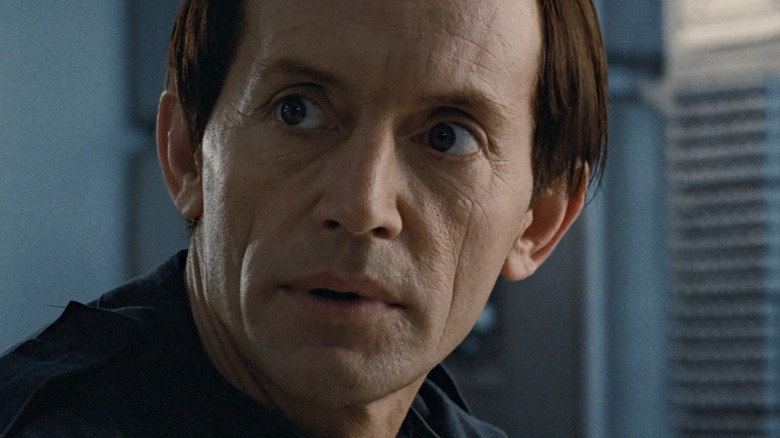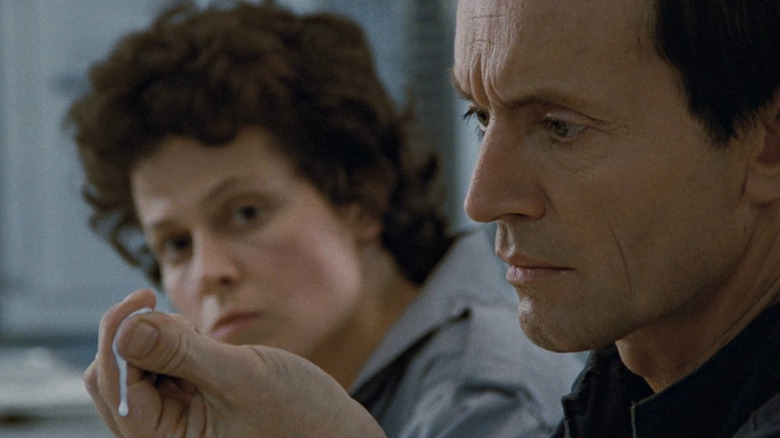Lance Henriksen's Android Performance In Aliens Was Centered On One Simple Philosophy
Lance Henriksen is one of the few actors besides Sigourney Weaver whose character lived to return for another installment in the "Alien" franchise. Ridley Scott's first "Alien" movie taught audiences and space survivor Ripley, played by Weaver, not to trust androids. Then, James Cameron's sequel, "Aliens," subverted that by introducing Henriksen's android Bishop, and casting doubt on his motives through Ripley, only to show that he was actually a trustworthy and loyal ally.
That's not to say Bishop would necessarily favor humans over aliens as an intrinsically better-natured life form. In a 1987 interview with "Starlog" magazine (via Strange Shapes), Henriksen said, "I told Jim [Cameron], 'Anything that's really organically alive is fascinating to Bishop. There's no good or evil — just this ultimate respect for anything living.'"
Henriksen also mentioned consulting books like "Mockingbird" by Walter Tevis for his "Aliens" role. "There's a bit in ['Mockingbird'] where the android knew how to play a piano, but didn't know why," he said. "He didn't know what music was, but he kept hearing it. It was part of his builder's input that hadn't been completely erased."
"That image stuck in my mind," Henriksen added, "and what it translated to me was that there were feelings that Bishop didn't understand, like a joke." 30 years later, "Alien: Covenant" would begin with a scene where another android, David (Michael Fassbender), played an "anemic" version of Richard Wagner's "Entry of the Gods Into Valhalla" on the piano, as if David, like Bishop, didn't understand the feelings behind the music.
Bishop was also subject to a kind of xenophobia in Henriksen's eyes. "He's an alien to anything alive," he said. "He must be as careful as, say, a Black man in South Africa, where you make a mistake and you're out. You're either replaced or you're destroyed."
'I'm gonna outlive you so I can eventually forgive you'
Henriksen also likened Bishop's innocent android perspective to that of a child. "I felt that he was only 10 years old, mechanically, so I gave him the emotional life of a 14-year-old," he said. "I was basically playing myself at that age. There's the knowledge that you have your whole life ahead of you to learn, yet there's always that vulnerability to the powers that be."
The actor has spoken elsewhere about how he drew from his own childhood when playing Bishop. In 2020, Henriksen returned to voice the character in an Audible adaptation of "Necromancer" author William Gibson's unproduced "Alien 3" script. Speaking to IGN, he said, "When I decided to do what I would do with Bishop, I was talking in my own mind, and I was using my childhood in a way. Bishop is like... if you're 12, and your parents are mean people or f*****-up people, you end up going, you know, I'm gonna outlive you so I can eventually forgive you for this bulls***. You know what I mean?"
While Bishop didn't end up outliving Ripley in "Alien" canon, he fared significantly better than the other members of her surrogate family from "Aliens." Newt (Carrie Henn) and Hicks (Michael Biehn) were famously killed off in an unceremonious fashion at the beginning of the notoriously troubled "Alien 3." Bishop, on the other hand, got plugged back in for one last scene with Ripley, followed by another cameo at the end from Henriksen as Bishop's human designer — a role he played as much behind-the-scenes, as an actor, as he did onscreen.

